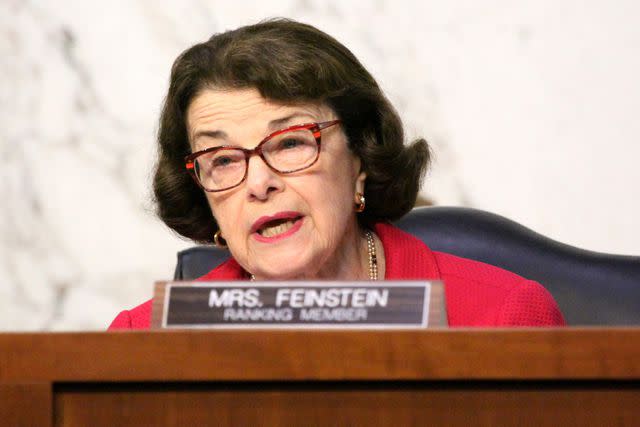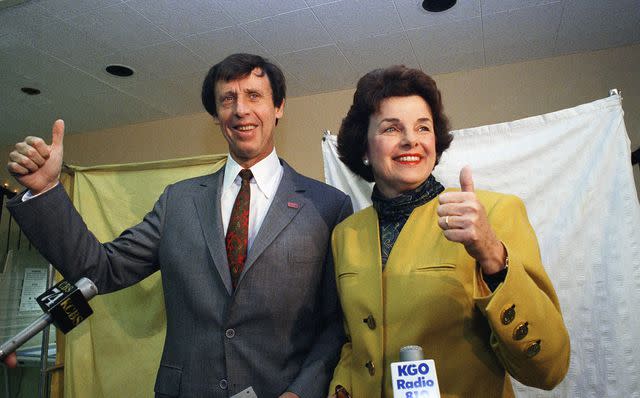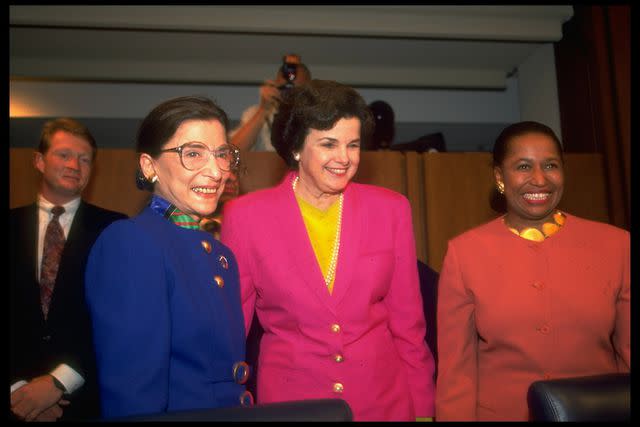Dianne Feinstein, Longest-Serving Female Senator, Dead at 90
- Oops!Something went wrong.Please try again later.
- Oops!Something went wrong.Please try again later.
- Oops!Something went wrong.Please try again later.
Sen. Feinstein, a California Democrat first elected in 1992, was a trailblazer in politics and the oldest sitting member of Congress at the time of her death
Sen. Dianne Feinstein died Thursday at the age of 90, her office announced.
"Sadly, Senator Feinstein passed away last night at her home in Washington, D.C.," her chief of staff, James Sauls, wrote in a statement issued Friday. "Her passing is a great loss for so many, from those who loved and cared for her to the people of California that she dedicated her life to serving."

Feinstein's legacy, Sauls added, is "undeniable and extraordinary."
"There is much to say about who she was and what she did, but for now, we are going to grieve the passing of our beloved boss, mentor and friend," Sauls added.
From the office of Senator Dianne Feinstein: pic.twitter.com/rvcAmVk8O0
— Senator Dianne Feinstein (@SenFeinstein) September 29, 2023
Feinstein, a Democrat from California, was the longest-serving female senator in U.S. history and the oldest sitting member of Congress. She was elected to the Senate in 1992, embarking on a congressional career during which she authored the federal Assault Weapons Ban in 1994 (which expired in 2014) and served as a leading voice for the legalization of gay marriage in 2015.
She also played a key role in Senate Intelligence Committee investigation into the CIA's use of torture in interrogations, which she has called "a stain on our values and on our history."
Related: Sen. Dianne Feinstein Responds After Colleagues' Accounts That Her Memory Is Deteriorating
Born Dianne Goldman in June 1933, she graduated from Stanford University in 1955 and went on to work in local government, serving as the San Francisco Board of Supervisor's first female president in 1978.
Her tenure in that role would draw national attention with the assassination of Supervisor Harvey Milk and Mayor George Moscone that same year. It was Feinstein who found Milk — San Francisco's first openly gay elected official — dead in his office after being assassinated by her fellow supervisor Dan White. As she checked for Milk's pulse, she would recall, her finger slipped into a bullet hole on his wrist.
It would also be Feinstein who, moments later, stood at the doors of City Hall to address a crowd with the news of the tragedy. "It is my duty to make this announcement," she said. "Mayor Moscone and Supervisor Harvey Milk have been shot and killed."
Following Moscone's assassination, Feinstein — as president of the Board of Supervisors — became acting mayor of San Francisco, going on to be elected to the role herself and serving from 1978 to 1988.
Related: Mayor Dianne Feinstein Fights for Tourists Who Left More Than Their Hearts in San Francisco
Feinstein recalled her role — both as mayor and as something of a calming force for a city in tumult — in a 2000 interview, saying: "The city needed to be reassured that there would be some consistency as we put the broken pieces back together. From that nonpartisan experience, I drew my greatest political lesson — the heart of political change is at the center of the political spectrum."
She launched a failed bid for governor upon leaving the mayor's office, but it was her 1992 election to the U.S. Senate that would go on to define her career.

Feinstein married three times, most recently to investment banker Richard Blum, whom she wed in 1980; he died of cancer in 2022 at the age of 86. Feinstein has one daughter of her own, Katherine Feinstein Mariano, from her first marriage.
In February 2023, she announced she would not seek reelection in 2024 amid rumors of cognitive decline, leading other notable California Democrats to announce bids to replace her.
Initially, Feinstein pushed back on such claims, even after the 2022 publication of a lengthy report, by the San Francisco Chronicle, in which four U.S. senators, including three Democrats, and three former staffers and a California Democrat serving in the House of Representatives all said Feinstein's memory was deteriorating to the point that they felt she could not fulfill her job duties without the help of her staff.
In a statement to PEOPLE shared by her press team in April 2022, Feinstein denied these accounts of infirmity.
"I remain committed to do what I said I would when I was re-elected in 2018: fight for Californians, especially on the economy and the key issues for California of water and fire," she said in the statement.
"While I have focused for much of the past year on my husband's health and ultimate passing, I have remained committed to achieving results and I'd put my record up against anyone's," she continued.
In March 2023, Feinstein announced she had been hospitalized with shingles in San Francisco and would take a leave from the Senate to recover.
Two-and-a-half months later, Feinstein returned to Capitol Hill in a wheelchair and was almost immediately met with additional calls for a resignation after the lawmaker told a reporter she hadn't been gone and never stopped working, seemingly not remembering her two-and-a-half month absence.
"No, I've been here. I've been voting," she said, when asked whether she intended to say that she had been working remotely from California. "Please. You either know or don't know."
California Democratic Gov. Gavin Newsom will now have the power to appoint a lawmaker to serve out the remainder of Feinstein’s term. In a 2021 interview with MSNBC, Newsom vowed that, should Feinstein resign before the end of her term, he would nominate a Black woman to fill her seat. There are currently no Black women serving in the U.S. Senate, though two previously did — one of them, Kamala Harris, left to join the Biden administration as vice president.
Related: California's 2024 Senate Race Is Poised to Be a Historic Showdown — Here Are the Candidates to Watch

As The New York Times once described her, Feinstein was something of "a California institution" — one that couldn't be toppled politically, even as her centrist politics often angered some of her Democratic colleagues (and more liberal constituents).
Her moderate views put her on the short list to be Walter Mondale's vice presidential pick in 1984, a historic moment for Feinstein, a Jewish woman. She was ultimately passed over in favor of Geraldine Ferraro.
"My youngest stepdaughter, Eileen, spent the night with me last night, and we were all sitting in bed," Feinstein told The Washington Post that year, of the vice presidential speculation. "And she said to me, 'Do you think anything'll happen?' And I said, 'No. But it's really an honor to be on that short list.' I'm one of a very few number of women, and I'm proud to be there. I mean, there's a certain sense of pride."
She continued: "I mean, after all the B.S. you can take in this job, well, I can hold my head high. And that's nice, too."
For more People news, make sure to sign up for our newsletter!
Read the original article on People.

